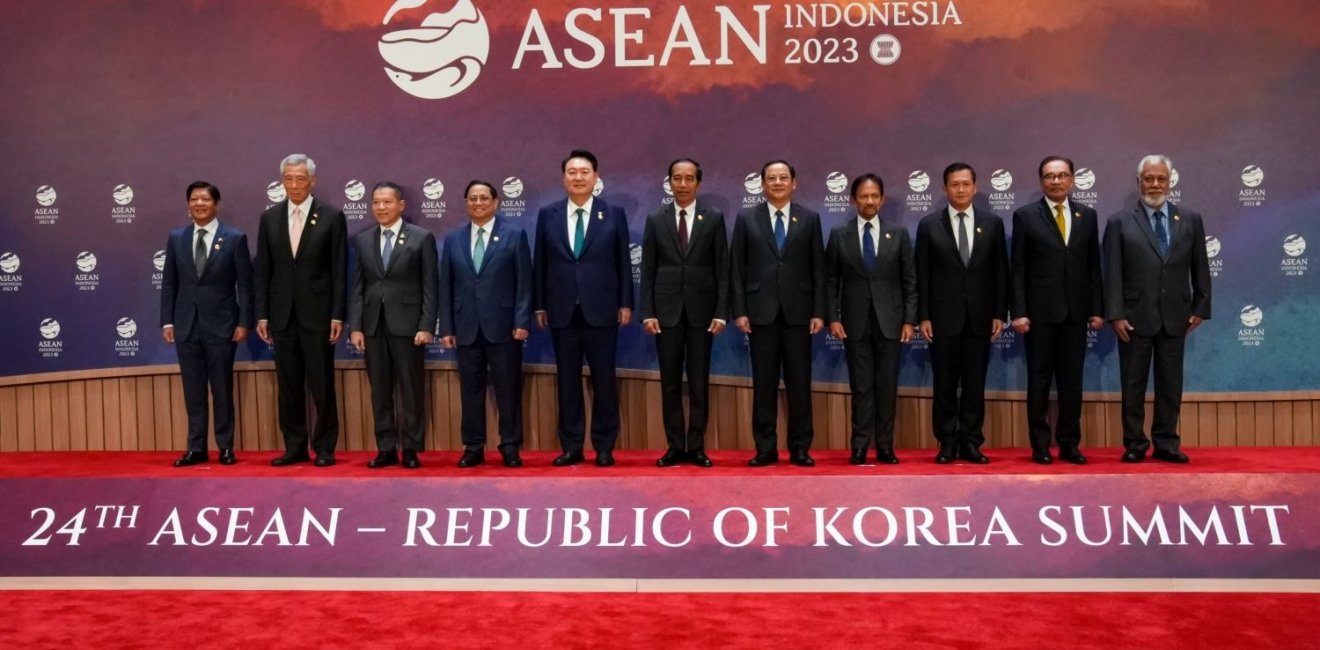
A blog of the Indo-Pacific Program
The year 2024 will mark the 35th anniversary of South Korea’s diplomatic relations with the Association of Southeast Asian Nations (ASEAN), representing a long and diverse relationship between the two. Highlighting this relationship, President Yoon Seok Yeol introduced South Korea’s new ASEAN policy, Korea-ASEAN Solidarity Initiative (KASI) at the Korea-ASEAN Summit in Cambodia in November 2022. Recently, South Korea has emphasized the centrality of ASEAN in South Korea's Indo-Pacific Strategy and expressed its commitment to supporting ASEAN's perspective on the Indo-Pacific region.
Moreover, the announcement of the KASI policy indicates South Korea’s intention to maintain its cooperative approach with ASEAN, with the South Korean President Yoon proposing to double the cooperation fund for ASEAN over the next five years, aiming to elevate the Korea-ASEAN relationship to a Comprehensive Strategic Partnership in commemoration of the South Korea-ASEAN anniversary of diplomatic relations later this year.
Interestingly, the most recent proposal—aimed at expanding strategic and security cooperation—presents both a change from South Korea’s historic engagement in the Southeast Asian region and new opportunities for the relationship overall.
South Korea’s Foreign Policy towards Southeast Asia in 21st century
Historically, South Korea’s foreign policy towards Southeast Asia fluctuated greatly, often placing emphasis on the Korean Peninsula and the North Korean security issue, rather than focusing on a well-defined policy vis-à-vis the Southeast Asia region.
In the early 2000s, former ROK President Kim Dae-jung, well-known as a winner of the Nobel Peace Prize winner for his famous Sunshine Policy towards North Korea, demonstrated an active interest in cooperation between the Northeast and Southeast Asian regions. At the time then-President Kim not only designed the East Asia Vision Group but also suggested the idea of an East Asia Study Group. However, South Korean policy changed under the next President Roh Moo-hyun administration’s Northeast Asian Cooperation Initiative, which focused on the Korean Peninsula and the Northeast region, without special consideration for a broader East Asia and by extension ASEAN.[1]
Later, during the Lee Myung-bak administration, the declaration of Global Korea policy once again expanded South Korea’s diplomatic reach beyond Northeast Asia. However, the security focus remained on the Korean Peninsula and the U.S.-ROK alliance. Although South Korea attempted to influence multilateral platforms such as the ASEAN Regional Forum (ARF), there was criticism that ROK policy disregarded the unique diplomatic style of ASEAN countries’ ASEAN Way.[2] Park Geun-hye's Trustpolitik aimed to build trust with neighboring countries and gained more favorable descriptions than previous government in ARF statements, while the Northeast Asia Peace and Cooperation Initiative and Eurasia Initiative showed the limitation in incorporating Southeast Asia.
Finally, Moon Jae-in administration’s New Southern Policy was the first region-specific foreign policy towards Southeast Asia and has been welcomed for its regional approach. However, some critics argued that the policy overlooked security agendas to maintain strategic ambiguity and placed too much emphasis on economic cooperation with specific countries, such as Vietnam and Singapore.
The Significance of Korea-ASEAN Solidarity Initiative and Prospective Steps for Advancement
Against this backdrop, South Korea’s newest policy agenda offers improved opportunities. Firstly, the KASI policy has the potential to overcome the frequent shifts in diplomatic policy due to changes in government and provide assurance of South Korea's continuous cooperation with ASEAN. Secondly, it may resolve criticism that previous policies faced by focusing less on economic, cultural, and social cooperation, and more on expanding the scope of security issues beyond Northeast Asia. Finally, South Korea, by reaffirms its commitments to Southeast Asia, strengthens its role as a middle power in the Indo-Pacific region through proactive and diverse cooperation.
However, there are still many challenges. First, South Korea’s strategic neutrality vis-à-vis China has noticably changed in recent years. Today South Korea’s political alignment and enhanced cooperation with Washington may cause ASEAN to lose its neutrality should the relationship between Korea and Southeast Asia expand. Additionally, Korea’s lack of network centrality on the East Asia political network may also become an obstacle.
Given this complex situation, in order for the most recent Southeast Asia-focused policy to be successful, South Korea should first and foremost be weary of imposing its diplomatic stance on each country for short-term results, demonstrate its long-term willingness to act as a "global" pivotal state.
By strengthening its engagement with each country in Southeast Asia respectively, South Korea may be able to utilize its unique role within the region as a mediator to resolve the tensions between the players.
Second, it is necessary for South Korea to strengthen its network centrality by deepening country-to-country exchange. So far, Korea has focused its relations on specific countries for economic reasons. By strengthening its engagement with each country in Southeast Asia respectively, South Korea may be able to utilize its unique role within the region as a mediator to resolve the tensions between the players.
Lastly, to ensure long-term policy consistency, South Korea will need to build domestic consensus on its foreign policy. The KASI policy depends mainly on Korean government expenditures, such as increasing ODA to ASEAN and allocating $200 million for ASEAN-ROK cooperation projects. If South Korea’s domestic economy continues to worsen, public support for foreign policy initiatives could weaken greatly.
Conclusion
Historically, South Korea’s security cooperation with Southeast Asian countries has not been considered as an important part of Korea's overall foreign diplomatic strategy. While limitations exist in terms of experience and scale, now may be a pivotal time for South Korea to leverage its advantages in geographical proximity and unique historical position towards Southeast Asia. As South Korea continues to respect ASEAN's centrality and neutrality, deepen cooperation with individual countries and implement its policies, the trust toward South Korea will also be enhanced, contributing to the sustainable peace of the Indo-Pacific region.
[1] Yang-Hee Kim. “An Assessment on the Northeast Asian Cooperation Initiative of the Rho Moo-Hyun Administrative.” Journal of Korean Social Trend and Perspective, no.74 (2008): 44-80.
[2] Chang Ku Byun. “Lee Myung-bak Government’s Multilateral Security Diplomacy and ASEAN Regional Forum.” Journal of Northeast Asian Studies, no. 67 (2013): 5-20.
This blog post is part of an ongoing NextGen series for the Korea Foundation Junior Scholar program. This series is made possible thanks to the generous support from the Korea Foundation. The opinions expressed in this publication are the views of the author(s). For questions/comments, please contact coordinating staff at Korea.Center@wilsoncenter.org.
Authors

B.A. (Bachelor of Arts), Department of Thai, Department of Integrated Japanese Studies, Hankuk University of Foreign Studies


Hyundai Motor-Korea Foundation Center for Korean History and Public Policy
The Center for Korean History and Public Policy was established in 2015 with the generous support of the Hyundai Motor Company and the Korea Foundation to provide a coherent, long-term platform for improving historical understanding of Korea and informing the public policy debate on the Korean peninsula in the United States and beyond. Read more


Indo-Pacific Program
The Indo-Pacific Program promotes policy debate and intellectual discussions on US interests in the Asia-Pacific as well as political, economic, security, and social issues relating to the world’s most populous and economically dynamic region. Read more





